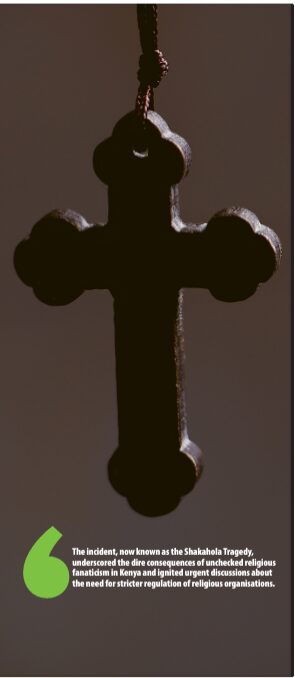Policing faith: The struggle for balance in Kenya’s Religious Organisations Bill, 2024

On the morning of April 22, 2023, Kenyans were horrified to learn of a police operation in Shakahola Forest, where mass graves were uncovered, revealing the tragic fate of followers of Pastor Paul Mackenzie, leader of the Good News International Church. Mackenzie had orchestrated a doomsday cult that ensnared hundreds in a destructive belief system, resulting in over 400 deaths in their misguided quest to “meet Jesus”.
The incident, now known as the Shakahola Tragedy, underscored the dire consequences of unchecked religious fanaticism in Kenya and ignited urgent discussions about the need for stricter regulation of religious organisations.
A year later, through the Religious Organisations Bill, 2024, legislators have stepped into murky waters of attempting to regulate religion. The Bill, which is sponsored by Tana River Senator Danson Mungatana, has already drawn resistance and upheaval, especially from the clergy who have rejected it. They cited, among other reasons, the restriction of freedom of religion and association protected under Articles 32 and 36 of the Constitution, respectively, and proposed taxation measures on income earned by religious organisations.
As legislators navigate these complexities, a significant question arises: How can Kenya establish a framework that protects its citizens while respecting the country’s diverse religious landscape?
The challenge extends beyond merely crafting laws; despite Kenya not having a State religion, the relationship between the church and the State is complicated, given the significant role Christianity plays in society. Balancing religious freedom with the need for regulation is essential for maintaining harmony and protecting vulnerable individuals from potential exploitation.
But first, let’s look into some of the salient features of the controversial Religious Organisations Bill, 2024.
Registration of religious organisations and their umbrella bodies
Currently, religious organisations in Kenya are registered as societies under the Societies Act (Cap 108, Laws of Kenya). However, some organisations that wish to hold property may opt to register as charitable trusts under the Trustees Perpetual Succession Act, as companies limited by guarantee under the Companies Act, or as limited liability partnerships under the Limited Liability Partnerships Act.
Under the Religious Organisations Bill, 2024, all religious organisations and umbrella religious organisations must be registered with the Registrar of Religious Organisations before commencing operations.
Eligibility or registration
Religious organisations must be supported by at least 25 individuals of the same faith, endorsed by an umbrella religious organisation, have a constitution that outlines their doctrine, and a management structure that includes a board of trustees with at least two-thirds being Kenyan citizens and at least one religious leader with formal theological training on the board.
Umbrella religious organisations must be supported by at least 25 proposed or registered religious organisations of a common faith, endorsed by at least five individuals without criminal convictions, have a constitution detailing their doctrine, and have a management structure that includes a board of trustees with at least two-thirds being Kenyan citizens and staff that includes a financial professional.
Registered religious organisations will be recognised as corporate bodies with perpetual succession, allowing them to sue, acquire property, and engage in financial activities in their corporate name.
However, some clergy members have raised concerns about the registration requirements and the stipulation for religious leaders with formal theological training on the board. They argue that the bill could restrict individuals from freely preaching on radio and television or conducting crusades, as failure to register their organisations could result in fines of up to Ksh5 million, imprisonment for up to three years, or both.
Taxation
One of the most contentious aspects of the Bill is its proposal to bring certain types of income from religious organisations under the tax authority’s scrutiny. Currently, religious organisations are eligible for tax exemptions under the Income Tax Act, which is granted upon application and is valid for five years.
Under the proposed Bill, however, religious organisations and umbrella bodies must maintain separate bank accounts for donations and income from economic activities. While donations remain tax-exempt if used for charitable purposes, income generated from economic activities will be taxable unless fully directed toward charitable causes.
Register of members
Under the Bill, a religious organisation is required to maintain a register of its members, including their names, contact information, and admission dates, and must update this register annually. Failure to comply with this requirement constitutes an offence, punishable by a fine of up to Ksh1 million for the organisation. Additionally, officials of the organisation may face individual fines of up to Ksh 500,000 or imprisonment for up to one year or both.
Other jurisdictions
Rwanda
Rwanda guarantees freedom of religion and expression under its constitution but lacks specific legislation governing religious organisations. Registration, regulation, and enforcement are managed by the Rwanda Governance Board, which requires religious organisations to submit their doctrine (statement of faith) and mandates that religious leaders possess a bachelor’s degree in religious studies.
In 2018, the Rwandan government closed about 9,000 places of worship, with over 6,000 remaining closed by 2022. For instance, on March 1, 2018, 700 churches and one mosque in Kigali Province were ordered to suspend activities due to health and safety concerns.
Uganda
Uganda’s legal requirements are similar to those in neighbouring Kenya. However, religious organisations must obtain operating licences from the Uganda Registration Services Bureau. Larger, historically established religious groups, such as Catholic, Anglican, Orthodox, Seventh-day Adventist Church, and Muslim organisations, are also required to secure these licences.
Conclusion
The Religious Organisations Bill, 2024, represents a significant attempt by the Kenyan government to regulate religious institutions in the wake of the Shakahola tragedy. While the Bill aims to protect citizens from exploitation and ensure accountability, it has sparked strong opposition from religious leaders who argue that it infringes on freedoms of religion and association. Balancing regulation with the protection of religious liberty remains a delicate task. As Kenya looks to other countries like Rwanda and Uganda for insights, it must navigate these challenges carefully to safeguard both individual rights and public safety.

